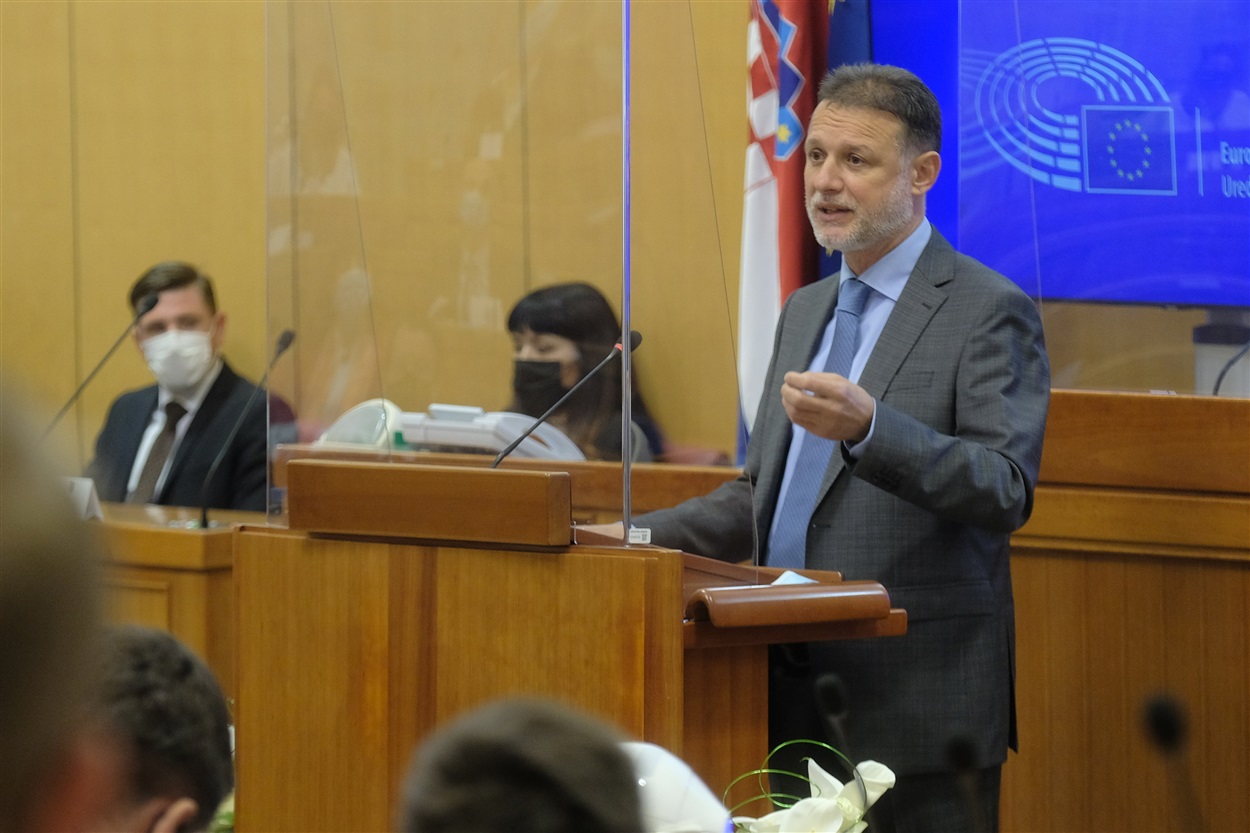
Zagreb - Successful Croatian stories and a plan to include citizens in Europe's development were presented on Tuesday at the Croatian Parliament, during the first part of the "Conference on the Future of Europe - Croatia's Vision," during which Speaker Gordan Jandroković entered a debate with a robot.
The Conference on the Future of Europe is a pan-European, democratic project during which citizens have an opportunity to decide on how the EU should develop. This is a project in which "citizens are in the centre," European Commissioner for Democracy and Demography Dubravka Šuica said.
Citizens can participate in panel discussions, debates, and the plenary session, in which 108 seats are reserved for citizens.
An equal number is allocated to representatives of national parliaments and MEPs.
The plenary session will also include 54 Council representatives (two for each member state), three members of the European Commission, and representatives of the Committee of the Regions, the European Economic and Social Council, social partners, and civil society.
"If we miss out on including citizens, we will leave room for populist ideas," said Šuica.
The conference provides a digital platform where citizens can exchange ideas, connect, make recommendations, and launch initiatives.
Šuica warned that according to forecasts, by 2070 Europeans will account for only 4% of the global population and she believes that demography will be a point of interest for citizens.
Robot argues with Jandroković
Parliament Speaker Gordan Jandroković was the conference's host and during his opening address, he was interrupted by Pepper the robot who warned him that he had violated the Standing Orders.
Pepper was made at the Faculty of Computing and Electrical Engineering in Zagreb.
Pepper and Jandroković then debated about parliamentary procedures. Jandroković explained that this is a demonstration of what the future holds. "If we are not smart enough, robots will manage us and not the other way around," he said.
Successful Croatian stories
Several successful Croatian stories were then presented to the parliament, including a project by the Sisak-Moslavina County Development Agency (SIMORA) promoting the town of Novska as the centre of the gaming industry in Croatia.
SIMORA director Mario Čelan said that the gaming industry, particularly now during the pandemic, had surpassed the film and music industry with regard to the total revenue generated.
He added that the project had already launched 49 start-ups and that a new, four-year study programme for gaming technicians had been developed as well as that the National Recovery and Resilience Plan envisaged a gaming industry campus.
This has motivated young people to settle in Novska and the town now has the largest number of companies in its history, he said.
Dragan Schwarz spoke about Radiochirurgia, a special hospital for oncology patients in Zagreb.
More than 45,000 patients have been examined in the five years since the hospital's establishment and more than 4,000 operations were performed, said Schwarz.
"Our results put us at the very top of the global scene," he added.
Sven Lončarić spoke about the Artificial Intelligence Centre (CAI) of the Zagreb Faculty of Computing and Electrical Engineering (FER), which consists of 19 research laboratories, with FER currently implementing around 260 projects financed from national and international sources.
Boranka campaign, Toljanić family awarded with Croatian Sabor medal
Scouts Croatia and the Toljanić family from the island of Krk were awarded the Croatian Sabor medal.
The Boranka project, implemented by the scouts' alliance, has been awarded the European Citizen's Prize by the European Parliament in 2020.
Boranka is the largest reforestation project in all of Europe. To date, more than 7,000 volunteers have planted more than 85,000 new trees in fire-devastated areas of Dalmatia.
The Toljanić family was named the European Family of the Year in 2020. The family has 12 children and has developed a successful winery and hospitality business.